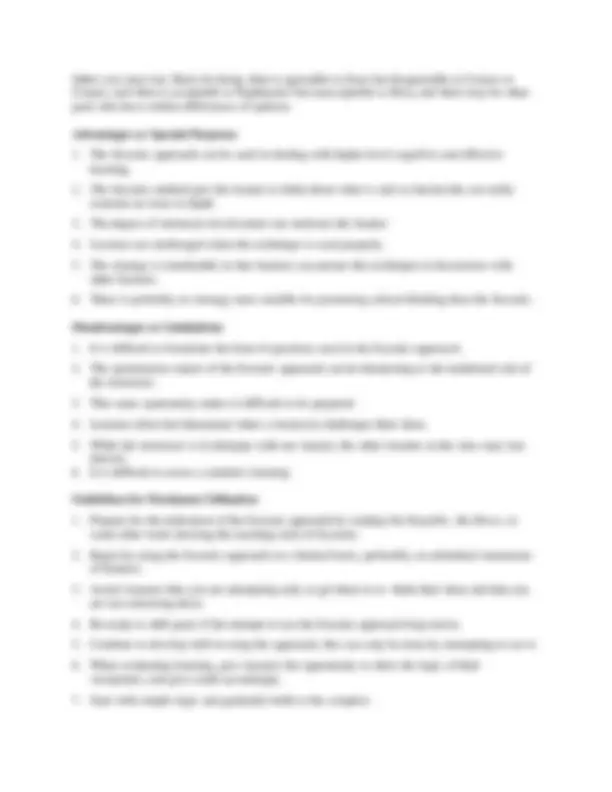





Study with the several resources on Docsity

Earn points by helping other students or get them with a premium plan


Prepare for your exams
Study with the several resources on Docsity

Earn points to download
Earn points by helping other students or get them with a premium plan
Community
Ask the community for help and clear up your study doubts
Discover the best universities in your country according to Docsity users
Free resources
Download our free guides on studying techniques, anxiety management strategies, and thesis advice from Docsity tutors
The socratic method is an educational approach named after the ancient greek philosopher socrates. It involves a teacher or facilitator asking questions to stimulate critical thinking and to draw out ideas and underlying presumptions. An in-depth analysis of the socratic method, including its definition, advantages, disadvantages, and guidelines for maximum utilization.
Typology: Study notes
1 / 5

This page cannot be seen from the preview
Don't miss anything!




Based on excerpts from The Expert Educator (Jones, et al. , 1994)
Definition and Description
The Dictionary of Education describes the Socratic method as "a process of discussion led by the instructor to induce the learner to question the validity of his reasoning or to reach a sound conclusion." The strategy derives its name from the approach used by Socrates as he assumed the role of intellectual midwife.
The Socratic approach was built upon the assumption that knowledge was within the learner and proper questioning and commentary could cause this knowledge to surface. Socrates, as instructor, attempted to follow the student's argument wherever it led.
The key to the Socratic approach is that the teacher's comments and questions must enable the learners to discover meaning for themselves.
In a typical classroom situation, the instructor would use the Socratic approach when the situation arose. It would be necessary for a learner to make a statement, often of a value nature which could be further pursued. The instructor would then enter into a dialogue with the learner, following the argument until the learner had thoroughly questioned the answer and gained some insight into the logic used or the attitudes and beliefs held.
Example
An example seems almost imperative to further explain the Socratic strategy .The following dialogue finds Socrates awaiting his own trial for impiety (irreverent). He is seeking knowledge concerning piety from Euthyphro, who is supposedly knowledgeable of such matters.
Socrates: I know that, dear friend; and that is the reason why I desire to be your disciple. For I observe that no one, not even Meletus appears to notice you; but his sharp eyes have found me out at once, and he has indicted me for impiety. And, therefore, I adjure you to tell me the nature of piety and impiety, which you said that you knew so well, and of murder and the rest of them. What are they? Is not piety in every action always the same? and impiety, again, is not that always the opposite of piety, and also the same with itself, having, as impiety, one notion which includes whatever is impious?
Euthyphro: To be sure, Socrates.
Socrates: And what is piety, and what is impiety?
Euthyphro: Piety is doing what I am doing; that is to say, prosecuting anyone who is guilty of murder, sacrilege, or of any other similar crime---whether he be your father or mother, or some other person, that makes no difference---and not prosecuting them is impiety. And please to consider, Socrates, what a notable proof I will give you of the truth of what I am saying, which I have already given to others:---of the truth, I mean, of the principles that the impious, whoever he may be, ought not to go unpunished. For do not men regard Zeus as the best and most righteous of the gods?--- even they admit, that he bound his father (Cronos) because he wickedly devoured his sons, and that he too had punished his own father (Uranus) for a similar reason, on a nameless manner. And yet when I proceed against my father, they are angry with me. This is their inconsistent way of talking when the gods are concerned, and when I am concerned.
Socrates: May not this be the reason, Euthyphro, why I am charged with impiety---that I cannot always [agree] with these stories about the gods? and therefore I supposed that people think me wrong. But as you who are well informed about them approve of them, I cannot do better than assent to your superior wisdom. For what else can I say, confession as I do, that I know nothing of them. I wish you would tell me whether you really believe that they are true?
Euthyphro: Yes, Socrates; and things more wonderful still, of which the world is in ignorance.
Socrates: And do you really believe that the gods fought with one another, and had dire quarrels, battles, and the like, as the poets say, and as you may see represented in the works of great artists? The temples are full of them; and notably the robe of Athene, which is carried up to the Acropolis at the great Panathenaea, is embroidered with them. Are all these tales of the gods true, Euthyphro?
Euthyphro: Yes, Socrates, and, as I was saying, I can tell you, if you would like to hear them, many other things about the gods which would quite amaze you.
Socrates: I dare say; and you shall tell me them at some other time when I have leisure. But just at present I would rather hear from you a more precise answer, which you have not as yet given, my friend, to the question, What is "piety?" In reply, you only say that piety is, doing as you do, charging your father with murder?
Euthyphro: And that is true, Socrates.
Socrates: I dare say, Euthyphro, but there are many other pious acts.
Euthyphro: There are.
Socrates: Remember that I did not ask you to give me two or three examples of piety, but to explain the general idea which makes all pious things to be pious. Do you not recollect that there was one idea which made the impious impious and the pious pious?
Euthyphro: I remember.
Socrates: Tell me what this is, and then I shall have a standard to which I may look, and by which I may measure the nature of actions, whether yours or anyone's else, and say that this action is pious, and that impious?
Euthyphro: I will tell you if you like. Socrates: I should very much like that.
Euthyphro: Piety, then is that which is dear to the gods and impiety is that which is not dear to them.
Socrates: Very good, Euthyphro; you have now given me just the sort of answer which I wanted. But whether it is true or not I cannot as yet tell, although I make no doubt that you will prove the truth of your words.
Euthyphro: Of course.
Socrates: Come, then, and let us examine what we are saying. That thing, or person which is dear to the gods is pious, and that thing or person which is hateful to the gods is impious. Was not that said?
Euthyphro: Yes that was said.
father you may very likely be doing what is agreeable to Zeus but disagreeable to Cronos or Uranus, and what is acceptable to Hephaestus but unacceptable to Hera, and there may be other gods who have similar differences of opinion.
Advantages or Special Purposes
Disadvantages or Limitations
Guidelines for Maximum Utilization
Summary
The Socratic strategy enables the instructor to aid the learner in examining his/her own beliefs, values, attitudes and his or her logic or inconsistency. It is a difficult strategy to master and requires a friendly "let's- look-at-this" relationship. If this atmosphere is not present, the instructor's questioning will be viewed as picky and critical by the learners, thus negating the purpose of the strategy. Learners need to comprehend the difference between criticizing and critical thinking for this strategy to work well.